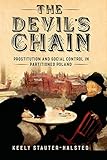The Devil's Chain : Prostitution and Social Control in Partitioned Poland / Keely Stauter-Halsted.
Material type: TextPublisher: Ithaca, NY : Cornell University Press, [2016]Copyright date: ©2016Description: 1 online resource (392 p.) : 16 halftonesContent type:
TextPublisher: Ithaca, NY : Cornell University Press, [2016]Copyright date: ©2016Description: 1 online resource (392 p.) : 16 halftonesContent type: - 9781501701665
- Prostitution -- Poland -- History -- 19th century
- Prostitution -- Poland -- History -- 20th century
- Sex -- Social aspects -- Poland -- History -- 19th century
- Sex -- Social aspects -- Poland -- History -- 20th century
- Europe
- History
- HISTORY / Europe / Eastern
- Poland, political independence, sex industry, commercial sex, prostitution, home-grown prostitution, paid sex, social control, sexuality, gender propriety, social class, transition to modernity, social reformers, Polish history, history of sexuality, urbanization, migration, professionalization
- 306.7409438 23
- HQ217.7.A5 S73 2015eb
- online - DeGruyter
| Item type | Current library | Call number | URL | Status | Notes | Barcode | |
|---|---|---|---|---|---|---|---|
 eBook
eBook
|
Biblioteca "Angelicum" Pont. Univ. S.Tommaso d'Aquino Nuvola online | online - DeGruyter (Browse shelf(Opens below)) | Online access | Not for loan (Accesso limitato) | Accesso per gli utenti autorizzati / Access for authorized users | (dgr)9781501701665 |
Browsing Biblioteca "Angelicum" Pont. Univ. S.Tommaso d'Aquino shelves, Shelving location: Nuvola online Close shelf browser (Hides shelf browser)

|

|

|

|

|

|

|
||
| online - DeGruyter The Depths of Russia : Oil, Power, and Culture after Socialism / | online - DeGruyter Deceit on the Road to War : Presidents, Politics, and American Democracy / | online - DeGruyter Chariots of Ladies : Francesc Eiximenis and the Court Culture of Medieval and Early Modern Iberia / | online - DeGruyter The Devil's Chain : Prostitution and Social Control in Partitioned Poland / | online - DeGruyter Gangs of Russia : From the Streets to the Corridors of Power / | online - DeGruyter The Deed of Reading : Literature * Writing * Language * Philosophy / | online - DeGruyter Building China : Informal Work and the New Precariat / |
Frontmatter -- Contents -- Acknowledgments -- Introduction: Reforming the National Body -- 1. Out of the Shadows -- 2. Into the Abyss: The Turn to Paid Sex -- 3. Sex and the Bourgeois Family -- 4. Narratives of Entrapment -- 5. Sex Trafficking and Human Migration -- 6. The Devil’s Chain -- 7. Female Activism and the Shadow State -- 8. The Physician and the Fallen Woman -- 9. Purity and Danger: Prostitution Reform and the Birth of Polish Eugenics -- 10. Sex in the New Republic -- Conclusion: Prostitution and the Shaping of the National Community -- Bibliography -- Index
restricted access online access with authorization star
http://purl.org/coar/access_right/c_16ec
In the half-century before Poland's long-awaited political independence in 1918, anxiety surrounding the country's burgeoning sex industry fueled nearly constant public debate. The Devil's Chain is the first book to examine the world of commercial sex throughout the partitioned Polish territories, uncovering a previously hidden conversation about sexuality, gender propriety, and social class. Keely Stauter-Halsted situates the preoccupation with prostitution in the context of Poland's struggle for political independence and its difficult transition to modernity. She traces the Poles’ growing anxiety about white slavery, venereal disease, and eugenics by examining the regulation of the female body, the rise of medical authority, and the role of social reformers in addressing the problem of paid sex.Stauter-Halsted argues that the sale of sex was positioned at the juncture of mass and elite cultures, affecting nearly every aspect of urban life and bringing together sharply divergent social classes in what had long been a radically stratified society. She captures the experiences of the impoverished women who turned to the streets and draws a vivid picture of the social milieu that shaped their choices. The Devil’s Chain demonstrates that discussions of prostitution and its attendant disorders—sexual deviancy, alcoholism, child abuse, vagrancy, and other related problems—reflected differing visions for the future of the Polish nation.
Mode of access: Internet via World Wide Web.
In English.
Description based on online resource; title from PDF title page (publisher's Web site, viewed 26. Apr 2024)


